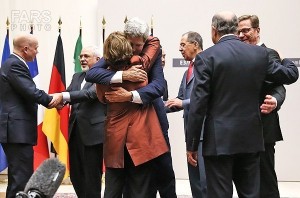 (Reuters) - Saudi Arabia and other Gulf Arab states, despite their mistrust of�Iran, gave a qualified welcome on Monday to Tehran's interim deal with world powers over its disputed nuclear program.
(Reuters) - Saudi Arabia and other Gulf Arab states, despite their mistrust of�Iran, gave a qualified welcome on Monday to Tehran's interim deal with world powers over its disputed nuclear program.U.S.-allied�Saudi Arabia, locked in a struggle with�Iran�for influence across the Middle East, is worried that its adversary is secretly seeking atomic weapons, a charge Tehran denies.
"If there was goodwill, this agreement could represent a preliminary step towards a comprehensive solution to the Iranian nuclear program," Saudi Arabia's cabinet said in a statement carried by state news agency SPA.
The kingdom said it hoped further steps would follow that would guarantee the rights of all states in the region to peaceful nuclear energy.
Earlier, Qatar and Kuwait came out in favor of the deal struck on Sunday after marathon talks in Geneva, saying they hoped it would help to preserve regional stability and security.
Israel condemned the agreement between Iran and world powers as a historic mistake that left the production of atomic weapons within Tehran's reach, and said it would not be bound by it.
The rulers of Saudi Arabia and some other Sunni-ruled Gulf monarchies fear Western d�tente with Shi'ite Iran could relieve pressure on Tehran and allow it more leeway in the Arab world.
They say Iran already dominates Iraq's Shi'ite-led government of Iraq, uses Hezbollah to pursue its interests in Lebanon and�Syria, and backs Shi'ite protests in Bahrain, as well as Houthi Shi'ite rebels in northern Yemen.
On Sunday a senior Saudi foreign policy adviser said he was deeply concerned that the deal could give Iran more scope to extend its power in Arab countries, signaling Riyadh's unease at the possibility of a Western rapprochement with Tehran.
"The government of Iran, month after month, has proven that it has an ugly agenda in the region, and in this regard no one in the region will sleep and assume things are going smoothly," said Abdullah al-Askar, chairman of the foreign affairs committee in the Shoura Council, an appointed quasi-parliament that advises the government on policy.
IMPORTANT STEP
Saudi Arabia and Qatar support Sunni-led rebels fighting to topple Syrian President Bashar al-Assad, an ally of Iran and a member of the Alawite sect, an offshoot of Shi'ite Islam.
Iran's only two Arab friends - Iraq and Syria - were quick to praise the deal on Sunday, as was the Palestinian Authority, which welcomed it for putting pressure on Israel. The United Arab Emirates and Bahrain also spoke out in support.
Qatar's Foreign Ministry called the agreement "an important step towards safeguarding peace and stability in the region" and said the Middle East should become a nuclear weapons-free zone.
Kuwait's Foreign Ministry Undersecretary Khaled al-Jarallah said he hoped the agreement "would pave the way for a permanent accord that would defuse tension and preserve the stability and security of the region", state news agency KUNA reported.
Oman, which had hosted U.S. and Iranian officials for secret talks that paved the way for the agreement, said it "hopes the interim agreement... will contribute to achieving peace and stability in the region", according to state news agency ONA.
By Reuters
The Iran Project is not responsible for the content of quoted articles.










